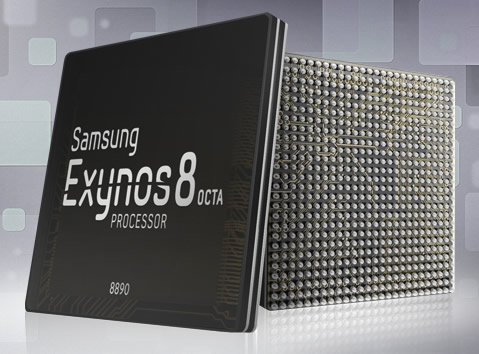
Samsung Officially Unveils The Exynos 8 Octa Application Processor
Samsung Electronics today officially announced the newest member of its Exynos family of application processors, the Exynos 8 Octa 8890. This is a premium chipset with Samsung custom-designed CPU and embedded LTE modem, manufactured using the company's 14-nanometer FinFET process technology. Unlike the previous Exynos 7 Octa 7420, the Exynos 8 Octa is an integrated one-chip solution that features the company’s first custom designed CPU based on 64-bit ARMv8 architecture and the latest LTE Rel.12 Cat.12/13 modem.
The Exynos 8 Octa is Samsung’s first application processor to include the company’s initial premium custom CPU cores based on 64-bit ARMv8 architecture providing over 30 percent improvement in performance and 10 percent in power efficiency compared to the Exynos 7 Octa. This chip also supports heterogeneous multi-processing for efficient usage of the eight cores, four custom and four ARM Cortex-A53.
As the name suggests, Exynos 8 Octa is powered by eight processing cores in total consisting of four big custom cores along with four small ARM Cortex-A53 cores. With Samsung’s own SCI (Samsung Coherent Interconnect) technology, which provides cache-coherency between big and small cores, the Exynos 8 Octa fully utilizes benefits of big.LITTLE structure for efficient usage of the eight cores.

Samsung has delivered one-chip Exynos solutions for mid to high-end smartphones in recent years. The Exynos 8 Octa integrates the most advanced LTE Rel.12 Cat.12/13 modem that enables maximum download speed of up to 600Mbps (Cat.12) and upload speed of up to 150Mbps (Cat.13) with carrier aggregation.
For a graphic-intensive user interface, 3D gaming and virtual reality experiences, the Exynos 8 Octa employs ARM’s latest GPU, Mali-T880. The GPU supports 4K UHD (4096x2160) & WQUXGA (3840x2400) display resolutions.
Samsung plans to begin mass production of the Exynos 8 Octa in late 2015. The AP is expected to power Samsung's Galaxy S7 smartphones, although the company is expected to use rival's Qualcomm's 820 AP as well in some devices.





















